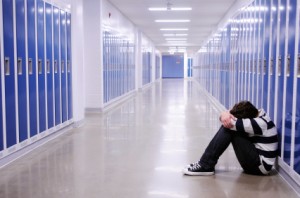 Whether it’s because of how they are dressed, their sexual preferences, or how much they weigh, it’s a sad fact that kids get bullied. Depending on how much a kid is being bullied and how long it has continued, bullying can result in your child developing depression, anxiety, Post Traumatic Stress Disorder (PTSD), or substance abuse.
Whether it’s because of how they are dressed, their sexual preferences, or how much they weigh, it’s a sad fact that kids get bullied. Depending on how much a kid is being bullied and how long it has continued, bullying can result in your child developing depression, anxiety, Post Traumatic Stress Disorder (PTSD), or substance abuse.
Bullying can leave your child feeling helpless and alone, which can result in devastating consequences. This year alone, at least 14 students have committed suicide as a result of being bullied by their peers.
Your teen won’t always tell you that they are being bullied because they may be too embarrassed or afraid. Unless you know what to keep an eye out for, you may have no idea that your child is suffering in silence.
Signs That Your Teen Is Being Bullied
Bullying is not always physical. It can also be done through emotional abuse (intimidation), verbal abuse (teasing), or cyberbullying (threatening through email or social media outlets, such as Facebook). However, these other types of bullying can be difficult to spot, especially if your teen is too ashamed to tell you about them.
The U.S. Health Resources and Services Administration suggests that you keep an eye out for the following signs if you are concerned that your child is being bullied:
- Unexplainable cuts, bruises, and scratches
- Having trouble sleeping or frequent nightmares
- Appearing anxious and suffering from low self-esteem
- Coming home from school with damaged clothing or belongings
- Spending less time with friends and family
- Acting afraid to go to school, walk to and from school, ride the bus, or participate in afterschool activities
- Loss of interest in school work or a drop in grades and performance
- Appearing sad, moody, teary, or depressed after school
- Complaining frequently of headaches, stomachaches, or other physical ailments
- Having thoughts of suicide
Things to Do if Your Child Is Being Bullied
If you recognize any of the above signs in your teen, talk to them to find out if they actually are being bullied. Do so in a way that is compassionate and caring, as your teen may be reluctant to tell you the truth.
If your teen is being bullied – in person or online – set up a meeting with teachers and staff at your teen’s school. Share your concerns with them and ask if they have observed any bullying themselves or any changes in your child’s behaviors. School officials may be in the best position to alert you to what’s going on and help take action.
Take immediate action if you discover that your teen is being bullied. Find out who the bullies are and exactly what happened. Don’t blame your teen or make them feel at fault, but instead let them know how brave it is for them to open up about something that is likely difficult for them to share.
Resist the urge to get in touch with the child who bullied your teen or their parents. That may make the problem worse. Instead, have school officials contact the bully’s parents and handle the situation.
Be sure to let your child know that it’s never OK to retaliate against the person bullying them, no matter how upset they are. If your child is exhibiting symptoms of depression, PTSD, or anxiety, or abusing substances, make sure you seek mental health treatment as soon as possible.
